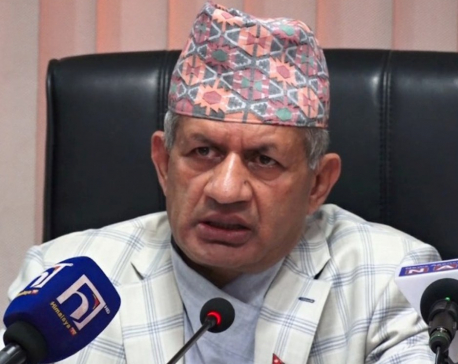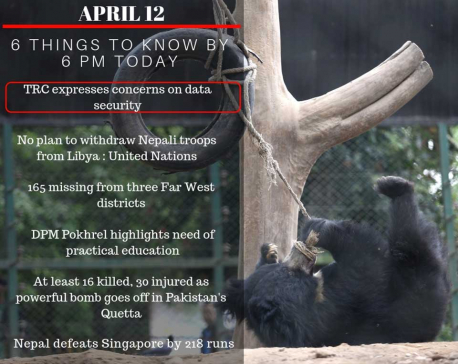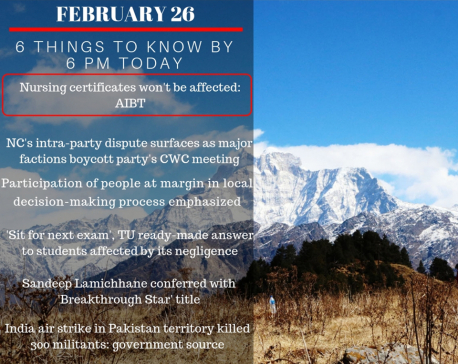
OR
Nepal’s ‘independent foreign policy put to test’ as it suspends meeting with Pakistan
Published On: March 31, 2019 06:00 AM NPT By: Kosh Raj Koirala | @KoshRKoirala

Also cancels visit of Pak speaker amid 'concerns from India'
KATHMANDU, March 31: As India flexes its diplomatic muscles in both its neighborhood and beyond to 'isolate' Pakistan over the alleged support of Islamabad to terrorist elements, Nepal's conduct of 'independent' foreign policy has met with a serious 'test'.
The decision of Nepal to suspend a foreign secretary level bilateral consultative mechanism meeting with Pakistan and the cancellation of the scheduled visit of Pakistan's House speaker to Nepal at the eleventh hour amid 'India's concerns' is a case in point, experts say.
Nepal had decided to defer the scheduled meeting of foreign secretary level bilateral consultative mechanism between Nepal and Pakistan on March 25-26— two days ahead of the visit of Indian Foreign Secretary Vijaya Gokhale to Kathmandu—after the Indian side communicated in the third week of March that its foreign secretary will be in Kathmandu to make comprehensive review of all bilateral issues including India-funded projects.
The Nepalese delegation led by Foreign Secretary Shanker Das Bairagi was scheduled to fly to Islamabad to take part in the long-stalled meeting scheduled for March 25-26, according to officials at the Ministry of Foreign Affairs (MoFA).
Although the concerned government officials did not comment on this, sources familiar with the development said that the meeting with Pakistan was put off after Indian side reportedly expressed its concerns. The government leadership had instructed the MoFA to put off the meeting until further notice, multiple sources confirmed.
“In diplomacy, all bilateral and multilateral meetings are held at the convenience of all member states concerned. The Nepalese side could have scheduled the meeting with Indian foreign secretary for some other date. After all, the meeting was not that urgent,” said a retired career diplomat and former ambassador, asking not to be named.
During his stay in Kathmandu, Indian Foreign Secretary Gokhale paid courtesy call on Prime Minister K P Sharma Oli and Foreign Minister Pradeep Kumar Gyawali. He held bilateral meeting with his Nepali counterpart Bairagi and 'discussed different aspects of Nepal-India relations', according to MoFA.
Indian Embassy in Kathmandu in a press statement on Thursday said that the two foreign secretaries exchanged views on regional and other issues of mutual interests, besides reviewing all aspects of wide ranging bilateral partnership. During his bilateral meeting, Foreign Secretary Gokhale had called for Nepal's support to curb terrorism for regional peace and stability, sources said.
The request of Indian Foreign Secretary Gokhale came amid India trying to isolate Pakistan for it alleged support to terrorism. The Indian side has alleged that Pakistan has been supporting the terrorist outfit Jaish-e-Mohhammad, responsible for suicide bombing on February 14 in which over 40 security personnel were killed in Kashmir—something Pakistan has denied outright.
As the visit came just ahead of the Nepal Investment Summit 2019, Indian Foreign Secretary Gokhale had also conveyed India's 'interests' to the Nepali side during his bilateral meetings. Indian policy makers have remained apprehensive of the growing Chinese investment in Nepal in the past one decade.
After the cancellation of Nepal-Pakistan foreign secretary-level bilateral consultative mechanism meeting, the Nepali side has also canceled the scheduled visit of Pakistani lawmakers' delegation led by Pakistani National Assembly Speaker Asad Qaiser. Officials at the Parliament Secretariat said the visit originally scheduled for March-end was put off until further notice at the instruction of the MoFA.
Former Nepalese ambassador and foreign policy expert Jayaraj Acharya termed it as an “immature' diplomatic practice.
“This shows how poor diplomatic skills we have. We seriously lack convincing skills—something very vital in diplomacy,” said Acharya. “This kind of immature practice also poses question to our independent foreign policy conduct.”
Experts argue that Nepal could have convinced the Indian side that the regular meetings and exchanges of visits were not aimed at any countries and that they were in line with Nepal's policy of 'amity with all and enmity with none'.
You May Like This

India, Pakistan should resolve Kashmir through dialogue: Gyawali
KATHMANDU, Aug 20: While refraining from taking a stand on India's recent move on Kashmir, Nepal has expressed a desire to... Read More...

April 12: 6 things to know by 6 PM today
Your daily dose of missed important news of the day. ... Read More...

Feb 26: 6 things to know by 6 PM today
Your daily dose of missed important news of the day. ... Read More...






Just In
- Youth attempts suicide amid police torture over Facebook comments against home minister
- Time to declare EVMs’ end
- World Malaria Day: Foreign returnees more susceptible to the vector-borne disease
- MoEST seeks EC’s help in identifying teachers linked to political parties
- 70 community and national forests affected by fire in Parbat till Wednesday
- NEPSE loses 3.24 points, while daily turnover inclines to Rs 2.36 billion
- Pak Embassy awards scholarships to 180 Nepali students
- President Paudel approves mobilization of army personnel for by-elections security












Leave A Comment